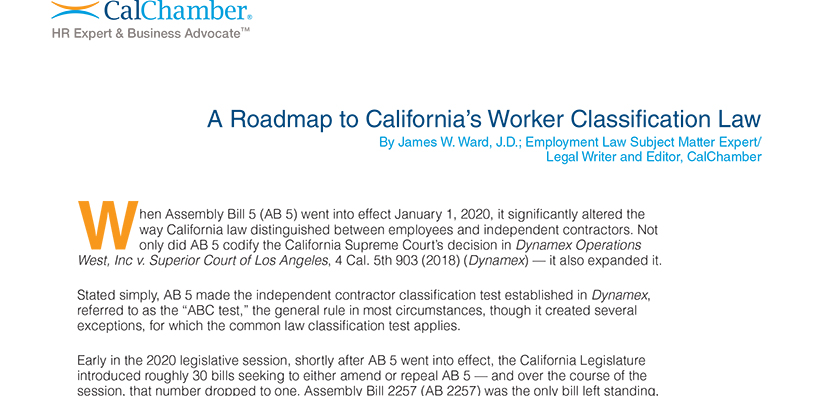Only last year California’s biggest labor law development was the new worker classification law, AB 5, which codified the California Supreme Court’s Dynamex ruling that largely departed from the longstanding common law factor-based approach to determining whether a worker is an independent contractor and established the more stringent ABC test in its place. AB 5 also created numerous industry exceptions to the ABC test, which, if various conditions were met, the old common law test would apply instead. This year, AB 2257 adds more industry exceptions and some revisions to California’s worker classification law, which are now in effect.
Controversy has followed AB 5 ever since it went into effect on January 1, 2020, with several lawsuits still pending. Early in this year’s legislative session, over 30 bills were introduced to either repeal or revise AB 5, but in the end, in no small part due to the COVID-19 pandemic, only one bill survived and was signed into law, AB 2257. AB 2257 went into effect when signed on September 4, 2020. The bill doesn’t change the ABC test or much of AB 5’s underlying framework but revises and clarifies some of the existing industry exceptions and adds new ones. While we can’t cover all numerous changes to the law here, here are a few of the highlights.
AB 2257 made some revisions to AB 5’s business-to-business exception — one of the most widely criticized provisions since its enactment. For example, under AB 5, a business service provider had to actually contract with other clientele besides the contracting business in order to qualify for the exception. Under AB 2257, the business service provider must be able to contract with other clientele but doesn’t actually need to have existing clientele for the exception to apply.
Additionally, AB 5 required that the business service provider only provide services directly to the contracting entity, not to its customers, which is problematic for a number of work/service arrangements. AB 2257 attempts to clarify this requirement by adding that the requirement doesn’t apply if the business service provider’s employees are “solely performing the service under the contract under the name of the business service provider and the provider regularly contracts with other businesses.” While these changes to the exception may be helpful to some, businesses should still consult with legal counsel about their business-to-business contracts.
AB 2257 also revised AB 5’s referral agencies exception, adding clarifying language, new services that may qualify under the exception and specifically excluding other industries from using it, giving employers a better sense of the contours of this exception.
In addition to modifying some of the broader exceptions to the ABC test, AB 2257 added a host of new ones, including exceptions for recording artists, songwriters, composers, recording artist managers, record producers and others in the industry of creating sound recordings and musical compositions, individual performing artists, licensed landscape architects, freelance translators, professional foresters, home inspectors, manufactured housing salespersons, individuals engaged in conducting international exchange visitor programs, competition judges, digital content aggregators, master-class teachers and more.
Like previous exceptions, various criteria and conditions qualify these added industry exceptions so employers in those industries should pay close attention to them.
Employers can learn much more detailed information in CalChamber’s newly revised, free worker classification white paper, A Roadmap to California’s Worker Classification Law. Our white paper discusses California’s worker classification law as revised by AB 2257, including a detailed discussion of the ABC test, the common law test and the increasing number of exceptions carved out for various occupations and industries.
James W. Ward, Employment Law Subject Matter Expert/Legal Writer and Editor
CalChamber members can read the white paper here. Not a member? See how CalChamber can help you.




